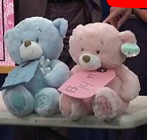I remember being pregnant with my daughter and having to exit a Toys-R-Us store, overwhelme d by aisles of pink toys and blue toys.
d by aisles of pink toys and blue toys.
That memory came to mind yesterday as I watched online California State Senator Hannah-Beth Jackson’s press conference, where she announced the introduction of SB 873. This bill would outlaw the “pink tax,” when there’s an up-charge on goods marketed to women and girls, compared to the cost of identical or similar products marketed to men.
It’s a real thing.
Not only did the fuzzy, wuzzy pink bear displayed at the press conference cost more than the twin blue bear sitting next to it, comprehensive research backs up the need to ban the pink tax.
In December 2015, The New York City Department of Consumer Affairs published From Cradle to Cane: The Cost of Being a Female Consumer. This study, which compared nearly 800 products offering male and female versions, found higher costs for:
- 55% of girls’ toys
- 26% of girls’ clothing
- 40% of women’s clothing
- 56% of women’s personal care products
- 45% of senior home health care products
“This kind of gender-based manipulation of the market is nonsense all on its own, but when you factor in the realities of our state’s gender pay gap it becomes all the more critical that we implement SB 873,” said Surina Khan, CEO of the Women’s Foundation of California, a sponsor of the bill.
SB 873 is also sponsored by the National Association of Women Business Owners, known as NAWBO, and the Consumer Federation of California.
It’s already illegal to charge men and women different prices for similar services, like haircuts and dry-cleaning, due to the Gender Tax Repeal Act of 1995, authored by then-Assemblywoman Jackie Speier.
Now a member of Congress, Speier also spoke at the press conference and has introduced H.R. 2048, the Pink Tax Repeal Act, which would ban gender-based discrimination in the pricing of goods and services throughout the nation.
